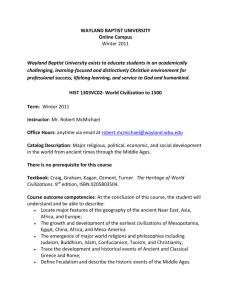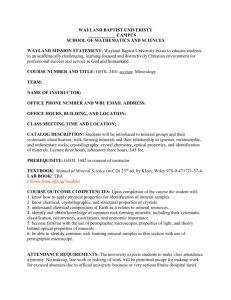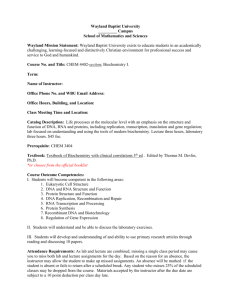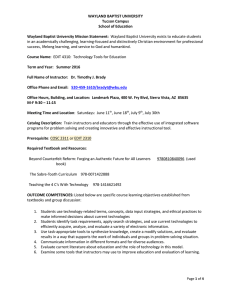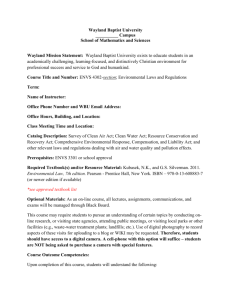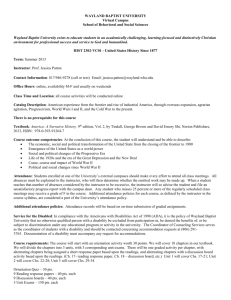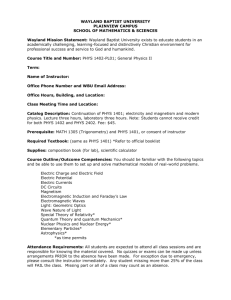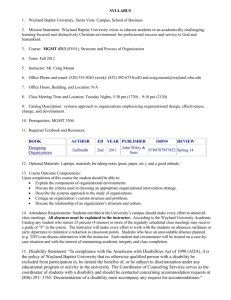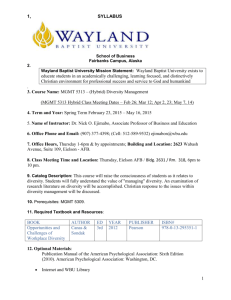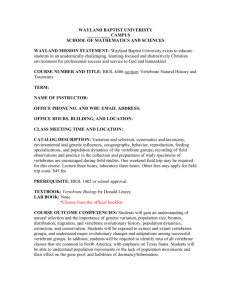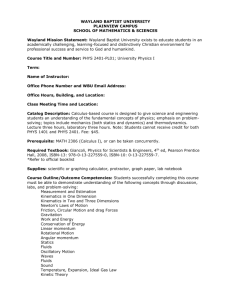Marriage and the Family - Wayland Baptist University
advertisement
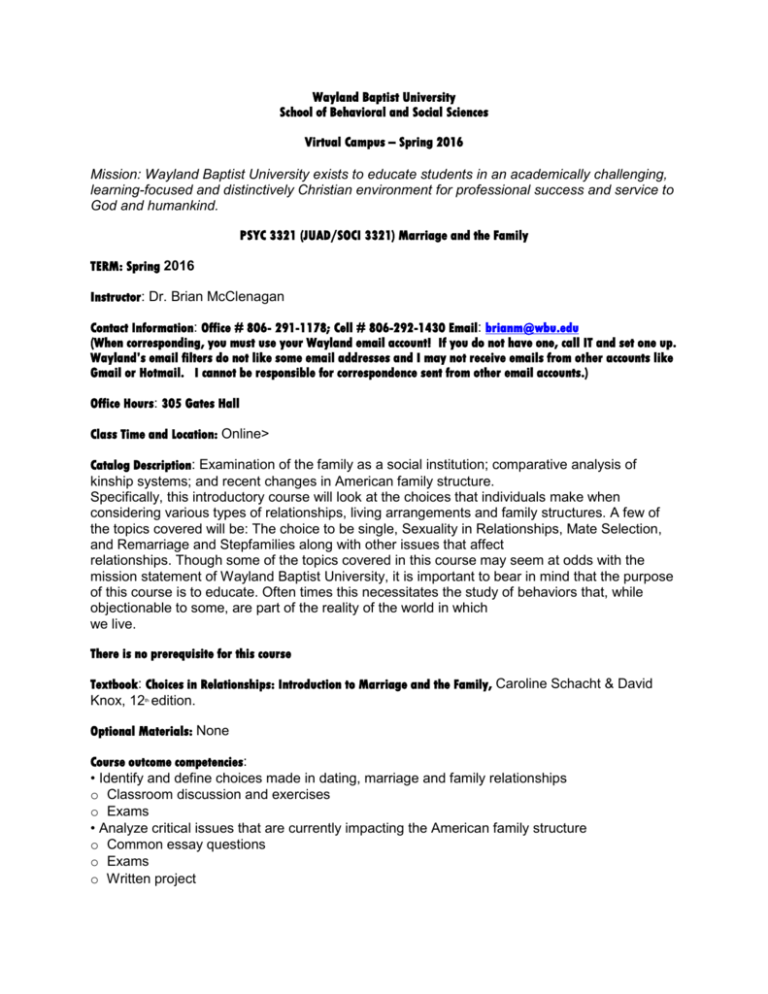
Wayland Baptist University School of Behavioral and Social Sciences Virtual Campus – Spring 2016 Mission: Wayland Baptist University exists to educate students in an academically challenging, learning-focused and distinctively Christian environment for professional success and service to God and humankind. PSYC 3321 (JUAD/SOCI 3321) Marriage and the Family TERM: Spring 2016 Instructor: Dr. Brian McClenagan Contact Information: Office # 806- 291-1178; Cell # 806-292-1430 Email: brianm@wbu.edu (When corresponding, you must use your Wayland email account! If you do not have one, call IT and set one up. Wayland’s email filters do not like some email addresses and I may not receive emails from other accounts like Gmail or Hotmail. I cannot be responsible for correspondence sent from other email accounts.) Office Hours: 305 Gates Hall Class Time and Location: Online> Catalog Description: Examination of the family as a social institution; comparative analysis of kinship systems; and recent changes in American family structure. Specifically, this introductory course will look at the choices that individuals make when considering various types of relationships, living arrangements and family structures. A few of the topics covered will be: The choice to be single, Sexuality in Relationships, Mate Selection, and Remarriage and Stepfamilies along with other issues that affect relationships. Though some of the topics covered in this course may seem at odds with the mission statement of Wayland Baptist University, it is important to bear in mind that the purpose of this course is to educate. Often times this necessitates the study of behaviors that, while objectionable to some, are part of the reality of the world in which we live. There is no prerequisite for this course Textbook: Choices in Relationships: Introduction to Marriage and the Family, Caroline Schacht & David Knox, 12 edition. th Optional Materials: None Course outcome competencies: • Identify and define choices made in dating, marriage and family relationships o Classroom discussion and exercises o Exams • Analyze critical issues that are currently impacting the American family structure o Common essay questions o Exams o Written project o Classroom discussion • Discuss the diverse family structures and how they effects American social institutions o Classroom discussion o Common essay questions • Communicate in writing from sociological, criminal justice or psychological perspectives the aspects of family life. o Written project o Common essay questions Attendance: Students enrolled at one of the University’s external campuses should make every effort to attend all class meetings. All absences must be explained to the instructor, who will then determine whether the omitted work may be made up. When a student reaches that number of absences considered by the instructor to be excessive, the instructor will so advise the student and file an unsatisfactory progress report with the campus dean. Any student who misses 25 percent or more of the regularly scheduled class meetings may receive a grade of F in the course. Additional attendance policies for each course, as defined by the instructor in the course syllabus, are considered a part of the University’s attendance policy. In the virtual class room, participation takes the place of attendance. Service for the Disabled: In compliance with the Americans with Disabilities Act of 1990 (ADA), it is the policy of Wayland Baptist University that no otherwise qualified person with a disability be excluded from participation in, be denied the benefits of, or be subject to discrimination under any educational program or activity in the university. The Coordinator of Counseling Services serves as the coordinator of students with a disability and should be contacted concerning accommodation requests at (806) 291- 3765. Documentation of a disability must accompany any request for accommodations. Course requirements: This course will consist of 4 graded parts, for a total of 550 points for the class: 1. Discussion Boards – Students will be required to respond to each question posted on the discussion board and also respond to at least two other student’s responses. Each chapter in your textbook includes an assessment that goes along with the subject matter of the chapter. We will occasionally use those assessments and your reactions to them as a basis for our discussion. Some weeks there may only be one discussion question, other weeks there may be none (usually weeks when there is an exam or another assignment due in the class). Some weeks may have as many as 2, but no more than 2, discussion questions.250 points total. 2. Exam 1 consisting of multiple choice questions and, possibly, a choice between 1 of 2 essay questions. 100 points. 3. A mid-term exam consisting of multiple choice questions and, possibly, a choice between 1 of 2 essay questions. 100 points 4. A final exam consisting of multiple choice questions and, possibly, a choice between 1 of 2 essay questions. 100 points. IMPORTANT!!! For the best response from Blackboard it is suggested that you go to the log in page of Blackboard and find the test your browser tab in the upper right-hand corner of the page and then run the test to see if your browser is compatible. If your version of Java is outdated, or you have a pop-up blocker this can cause you to be unable to access certain aspects of the course. Method of determining course grade: The University has a standard grade scale: A = 90-100, B = 80-89, C = 70-79, D = 60-69, F= below 60, W = Withdrawal, WP = withdrew passing, WF = withdrew failing, I = incomplete. An incomplete may be given within the last two weeks of a long term or within the last two days of a micro term to a student who is passing, but has not completed a term paper, examination, or other required work for reasons beyond the student’s control. A grade of “incomplete” is changed if the work required is completed prior to the last day of the next long (10 to 15 weeks) term, unless the instructor designates an earlier date for completion. If the work is not completed by the appropriate date, the I is converted to an F. Instructor's policy on Academic Dishonesty: Academic dishonesty is not tolerated. A student caught cheating, including plagiarism, could experience one of several consequences including: 1. A reprimand 2. A failing grade for the assignment, exam etc. 3. A failing grade for the entire term 4. Suspension from the university Furthermore, all incidents of academic dishonesty will be reported to the Vice President/ Provost of academic affairs. Tentative Schedule: WEEK: 1: Feb. 22-28: Introductions, Chapter 1 - Choices in Relationships: An Introduction 2: Feb. 29-Mar. 6: Chapter 2 – Love, Chapter 3 – Gender 3: Mar. 7-13: Chapter 4 – Singlehood: Hanging Out, Hooking Up & Cohabitation 4: Mar – 14-20: Spring Break: No class 5: Mar. 21-27: Exam I Study Guide Posted: Chapter 5 – Selecting a Partner 6: Mar. 28-April 3: Exam I: Chapter 1-5 7: April 4-10: Chapter 6 – Marriage Relationships Chapter 7 – GLBT Individuals, Couples, and Families 8: April. 11-17: Exam II Study Guide Posted Chapter 9 - Sexuality in Relationships, Chapter 10 Violence and Abuse in Relationships 9: April 18-24: Exam II: Final Exam Study Guide Posted: Chapters 6,7,9, & 10 8: April 25-May 1: Chapter 12 - Parenting, Chapter - 14 Stress and Crisis in Relationships 9: May 2-8: Chapter 15 – Divorce and Remarriage, Chapter 16 – Relationships in the Later Years 10: May 9-15: Final Exam Chapters 12, 14, 15, & 16 Some of the chapters covered could change.
